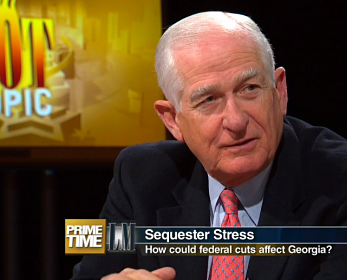You are here
Sequestration Challenges and Insights
Over the years, I’ve found that there are many people who feel passionate about public health and recognize the vital role the Centers for Disease Control and Prevention (CDC) plays in our nation’s health and security. While some of these individuals speak up before their friends, neighbors and work colleagues, others, including a select group of business leaders with no real vested interest in CDC, have decided to voice their views to elected officials.
In the past, as just a few example, Phil Jacobs, Oz Nelson and Bernie Marcus—former heads of AT&T Georgia, UPS, and Home Depot, respectively—took on this task. Today, David Ratcliffe, previously CEO of Southern Company and also a member of the CDC Foundation’s board, is involved in this effort.
 Earlier this week, David appeared on Georgia Public Television’s Prime Time Lawmakers program to discuss CDC’s importance, not only to the state of Georgia but to the nation more broadly. David’s comments were, of course, driven by the topic of the moment—the across the board and automatic sequestration budget cuts that are to occur on March 1 if something is not done. (Here’s the link to the GPTV broadcast; note the sequestration segment begins at 19:05, which you can quickly scroll to in the video.)
Earlier this week, David appeared on Georgia Public Television’s Prime Time Lawmakers program to discuss CDC’s importance, not only to the state of Georgia but to the nation more broadly. David’s comments were, of course, driven by the topic of the moment—the across the board and automatic sequestration budget cuts that are to occur on March 1 if something is not done. (Here’s the link to the GPTV broadcast; note the sequestration segment begins at 19:05, which you can quickly scroll to in the video.)
In his discussion, David made a notable analogy, likening CDC’s public health work to the U.S. military, stating CDC is “defense for our country in a health sense.”
GPTV host Scott Slade during the interview highlighted that two-thirds of CDC’s funding goes to state and local health departments and asked what CDC’s potential budget cuts (estimated to be around $350 million in CDC’s case this year) could mean in this regard. David provided valuable insight through one particular example:
“About 2,500 folks would not be on that front line of defense to allow us to detect and do something about all kinds of diseases that break out across the country on an annual basis. Very few folks know that the CDC starts an investigation about something every single day. It may not turn into anything, but it could turn into meningitis, listeria, H1N1, flu pandemic. So, it’s vitally important to preserve that core capability.
“The estimate is that about 840,000 vaccinations wouldn’t occur, so people would get sick. And we incur the healthcare costs associated with that.”
If across the board cuts are going to occur, David made an essential point about how to implement them.
“I think it’s important that we try to provide as much flexibility to the people who are running these agencies as we possibly can in how to manage the cuts. That’s one of the issues for the CDC. Their budget is a line item kind of thing. Doing across the board cuts on a standard percentage is not really a good way to run this kind of reduction. I think we give the agency heads more authority in where they take the cuts and then challenge them to manage more efficiently their processes. I know in the case of the CDC that they have an objective in 2012 to take $100 million out of their costs, and they’ve done that… They are already beginning to deal with fewer resources.”
We’ll soon know one way or the other how the current sequestration challenges play out. It’s my hope that we find a way to deal with them in a way that ensures CDC can effectively continue to guard the health and security of our nation. In this respect, I’ll close with a final quote from David:
“… we are dealing with essential services to the welfare of the country, we have to make sure we don’t cut too far. Maintaining the health and capability of the country is absolutely important for corporate America and for everyday people.”